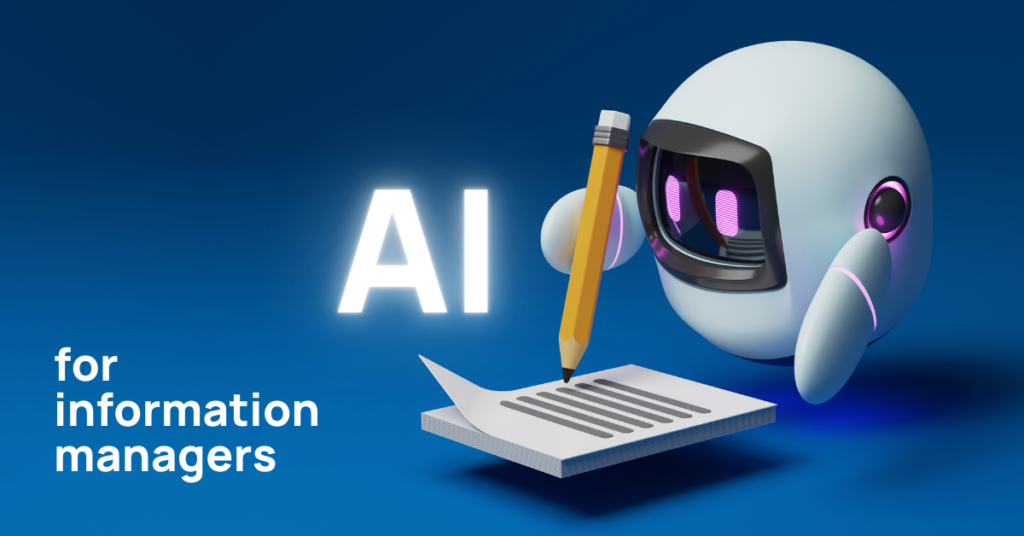
Artificial Intelligence (AI) has revolutionised information management in recent years by providing powerful tools to automate and optimise various tasks. Here are some great ways in which AI is being used in information management that you might not have known about:
Benefits of AI for information management
- Natural Language Processing (NLP): NLP is a branch of AI that helps computers understand and interpret human language. NLP can be used to analyse unstructured data like text documents, social media posts, and customer feedback to extract valuable insights and identify patterns.
- Information Retrieval: AI can help improve the accuracy and efficiency of information retrieval by understanding the context of the user’s query and presenting the most relevant information. Search engines, chatbots, and virtual assistants are all examples of AI-powered information retrieval systems.
- Data Cleansing: AI algorithms can automatically detect and correct errors in data, reducing the time and effort required for data cleansing. This can help improve data quality and prevent errors from affecting business decisions.
- Predictive Analytics: AI can analyse historical data and use it to predict future trends and outcomes. Predictive analytics can help organizations make more informed decisions, optimize business processes, and identify new opportunities.
- Document Classification: AI can be used to classify documents based on their content, format, and other attributes. This can help organisations organise and manage large volumes of documents more efficiently.
Overall, AI has the potential to significantly improve the efficiency and effectiveness of information management processes. As the technology continues to evolve, we can expect to see even more innovative applications of AI in this field.
While there are many benefits to using AI in information management, there are also several risks and challenges that need to be considered. Here are some potential risks associated with using AI in information management:
Risks of AI for information management
- Data Privacy and Security: AI systems require access to large amounts of data to function effectively, which can raise concerns about data privacy and security. There is a risk that sensitive information could be exposed or compromised through data breaches, hacking, unauthorised access or people posting sensitive information in the publicly available AI tools such as Chat GPT.
- Bias and Discrimination: AI algorithms are only as good as the data they are trained on, and if that data is biased, it can lead to discriminatory or unfair outcomes. For example, if an AI system is trained on biased hiring data, it could perpetuate discrimination in recruitment processes.
- Lack of Transparency and Explainability: Some AI models, such as deep learning neural networks, can be difficult to interpret and understand. This lack of transparency can make it challenging to identify the underlying factors driving the AI system’s decisions, which can be problematic if the outcomes are unfavourable.
- Reliance on Technology: While AI can improve efficiency and accuracy in information management processes, there is a risk of over-reliance on technology. This can lead to a loss of critical thinking and decision-making skills among human workers, which could be detrimental in situations where the AI system fails or makes mistakes.
To mitigate these risks, it’s important to implement appropriate security measures to protect user data, ensure that AI systems are trained on diverse and representative data, establish ethical guidelines for the use of AI in information management, and prioritise transparency and explainability in AI systems. Additionally, it’s important to maintain a balance between the use of AI and human decision-making skills in information management processes.
AI is a large subject that will inevitably change and progress over time. Leadership Through Data are committed to writing about this subject in relation to information management and will keep you updated with new developments and changes.
What AI tools do Microsoft have for information managers?
One such tool we’d like to tell you about is Microsoft Syntex.
Microsoft Syntex is an intelligent document processing solution in Microsoft 365 built using Artificial Intelligence (AI) and Machine Learning (ML) techniques. It can help manage content at scale in your organization by providing structure (content types and metadata) and governance (protection and retention controls) to files in SharePoint.





